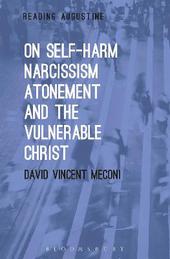
|
On Self-Harm, Narcissism, Atonement, and the Vulnerable Christ
Hardback
Main Details
| Title |
On Self-Harm, Narcissism, Atonement, and the Vulnerable Christ
|
| Authors and Contributors |
By (author) Fr. David Vincent Meconi
|
| Series | Reading Augustine |
|---|
| Physical Properties |
| Format:Hardback | | Pages:184 | | Dimensions(mm): Height 216,Width 140 |
|
| Category/Genre | Ethics and moral philosophy
Philosophy of religion
Christian theology |
|---|
| ISBN/Barcode |
9781501326202
|
| Classifications | Dewey:241.3 |
|---|
| Audience | | Tertiary Education (US: College) | |
|---|
|
Publishing Details |
| Publisher |
Bloomsbury Publishing Plc
|
| Imprint |
Bloomsbury Academic USA
|
| Publication Date |
14 November 2019 |
| Publication Country |
United States
|
Description
On Self-Harm, Narcissism, Atonement and the Vulnerable Christ explores St. Augustine of Hippo's theology of sin, described as various forms of self-loathing and self-destruction, in addition to sin's antidote, a vulnerable relationship with the crucified Christ. Incorporating recent thinking on self-destruction and self-loathing into his reading of Augustine, David Vincent Meconi explores why we are not only allured by sin, but will actually destroy ourselves to attain it, even when we are all too well aware that this sin will bring us no true, lasting pleasure. Meconi traces the phenomena of self-destruction and self-loathing from Augustine to today. In particular, he focuses in on how self-love can turn to self-harm, and the need to provide salvage for such woundedness by surrendering to Christ, showing how Augustine's theology of sin and salvation is still crucially applicable in contemporary life and societies.
Author Biography
David Vincent Meconi, S.J., is the Director of the Catholic Studies Centre and Professor of Theology at Saint Louis University, USA. His recent publications include The One Christ: St. Augustine's Theology of Deification (2013) and, as editor, The Confessions: Saint Augustine of Hippo (2012) and (co-edited with Eleonore Stump) The Cambridge Companion to Augustine (2014). He is the Editor of Homiletic and Pastoral Review.
ReviewsIt takes great philosophical tact and a pastor's humility to be able to enter into the troubled waters of self-hatred and find there the wreckage, still salvageable, of a lost love. David Meconi possesses tact and humility in abundance, and he writes beautifully on behalf of "those who want to disappear" (desiderantibus evanescere). By his Augustinian lights, that is, at some time or another, just about all of us. * James Wetzel, Villanova University, USA *
|